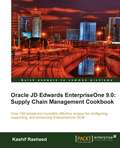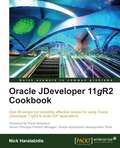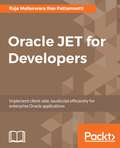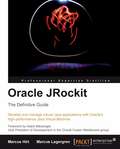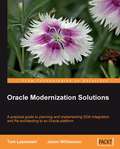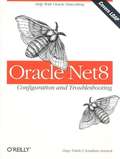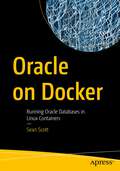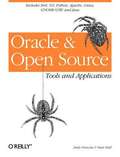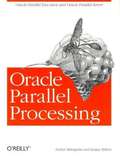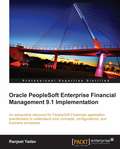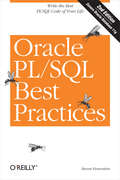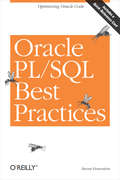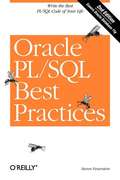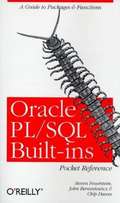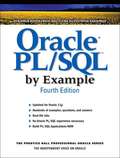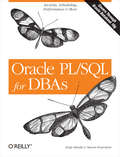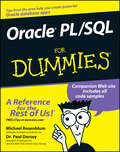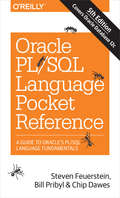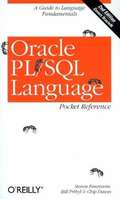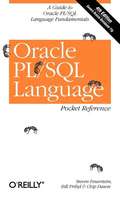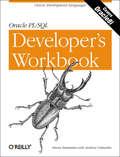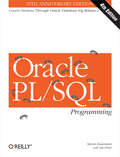- Table View
- List View
Oracle JD Edwards EnterpriseOne 9.0: Supply Chain Management Cookbook
by Kashif RasheedA cookbook full of practical and immediately useable recipes for real world business implementation of EnterpriseOne Supply Chain Management. If you are a functional consultant, technical consultant/developer, or project manager and want to improve your business perspective of EnterpriseOne SCM, this book is for you. You should have basic knowledge of navigating EnterpriseOne and general supply chain familiarity. Knowledge of the Common Foundation JDE 9.0 module is advantageous; the supply chain business domain knowledge will be an add-on to this.
Oracle JDeveloper 11gR2 Cookbook
by Nick Haralabidis"Oracle JDeveloper 11gR2 Cookbook" is a practical cookbook which goes beyond the basics with immediately applicable recipes for building ADF applications at an intermediate-to-advanced level. If you are a JavaEE developer who wants to go beyond the basics of building ADF applications with Oracle JDeveloper 11gR2 and get hands on with practical recipes, this book is for you. You should be comfortable with general Java development principles, the JDeveloper IDE, and ADF basics
Oracle JET for Developers
by Raja Malleswara PattamsettiClient side JavaScript for enterprise Oracle applications. About This Book • Develop resilient and robust client-side applications • Explore the power of popular JavaScript libraries such as jQuery, RequireJS, and custom Oracle JavaScript libraries • Integrate JavaScript for Oracle developers • Easily debug and secure your cloud interfaces Who This Book Is For If you are a web components developer looking to create client-side apps that are resilient and robust using Oracle JET, then this book is the right choice for you. What You Will Learn • Use Yeoman or npm to start a new Oracle JET-based project • Implement real-world use cases using Oracle JET components • Get to know the best practices for Oracle JET web applications • Explore Knockout.js, the framework behind Oracle JET • Implement a multi-platform app with OJ and Cordova In Detail This book will give you a complete practical understanding of the Oracle JavaScript Extension Toolkit (JET) and how you can use it to develop efficient client-side applications with ease. It will tell you how to get your own customized Oracle JET set up. You'll start with individual libraries, such as jQuery, Cordova, and Require.js. You'll also get to work with the JavaScript libraries created by Oracle, especially for cloud developers. You'll use these tools to create a working backend application with these libraries. Using the latest Oracle Alta UI, you'll develop a state-of-the-art backend for your cloud applications. You'll learn how to develop and integrate the different cloud services required for your application and use other third-party libraries to get more features from your cloud applications. Toward the end of the book, you'll learn how to manage and secure your cloud applications, and test them to ensure seamless deployment. Style and approach This book will have a practical step by step approach where every step of application development will be explained in detail with code samples.
Oracle JRockit: The Definitive Guide
by Marcus Lagergren Marcus HirtFilled with careful step-by-step instructions and plenty of screenshots, this tutorial shows you JRockit and how to get the most from it. All key concepts in the JRockit JVM, such as code generation, memory management and other internals are introduced. Performance aspects of Java are discussed in detail. A complete guide to use the tools in the JRockit Mission Control suite is also included, and much more. This book is for intermediate to advanced Java Developers, who want to monitor, diagnose, profile and enhance the performance of their Java applications. It is also for people who want to understand more about the internal workings of a modern Java Virtual Machine or adaptive runtime. Parts of the book are suitable as course material for education about runtimes.
Oracle Modernization Solutions
by Jason Williamson Tom LaszewskiThis book combines case studies with practical examples of how to implement modernization techniques using Oracle (and partner) products to modernize to the Oracle Platform. The book also weighs the pros and cons of specific modernization use cases. Finally, we explore some of the emerging trends in technology and how they apply to legacy modernization. Legacy system architects, project managers, program managers, developers, database architects and decision makers who own mainframe and heterogeneous systems, and are tasked with modernization will all find this book useful. The book assumes some knowledge of mainframes, J2EE, SOA, and Oracle technologies. The reader should have some background in programming and database design.
Oracle Net8 Configuration and Troubleshooting
by Jonathan Gennick Hugo ToledoDescribes everything DBAs need to know to install configure, tune, and troubleshoot Net8, Oracle's networking technology. It covers the Oracle Internet Directory (OID), Oracle Names; the Multi-Threaded Server (MTS); and the Oracle Connection Manager, as well as the Oracle networking utilities (lsnctl, namesctl, cmctl, tnsping, Net8 Assistant, Net8 Easy Config, and Net8 Configuration Assistant). In addition, it provides networking troubleshooting techniques, commonly encountered Net8 configuration problems,
Oracle on Docker: Running Oracle Databases in Linux Containers
by Sean ScottDiscover the benefits of running Oracle databases in Linux containers. This book approaches containers from the perspective of database administrators, developers, and systems administrators. It explains the differences between containers and virtual machines and describes why containers deliver greater speed, flexibility, and portability, with lower resource requirements. You’ll learn how running Oracle databases in containers complements existing database infrastructure and accelerates development, and you’ll understand the advantages they offer for test and validation environments. This book teaches you how to begin working with Oracle databases in Docker, covering the steps for preparing and installing software on Windows, Mac, and Linux systems. It describes the steps for deploying Oracle databases, separating data and configurations from database software, and networking and communicating with your containers. It introduces the Docker commands you’ll use for managing containers, including tips and shortcuts to make everyday tasks easier. Databases have unique demands for performance and reliability, and this book addresses those qualities with discussions on protecting, persisting, and distributing data. Other books may overlook these topics and approach containers as disposable commodities in serverless environments or convenient coding platforms. You’ll gain battle-tested insights for customizing and extending your containers to meet different needs. The opening chapters concentrate on the practical steps of running Oracle databases in Docker. Once you’re comfortable with container terminology and methods, you’ll look deeper at the real power behind containers—preparing and building images, and the templates that form the foundation beneath every container. You’ll begin by modifying publicly available image manifests, or Dockerfiles, following multiple examples that add functionality and capabilities to your databases. You’ll discover methods for using run-time options to create flexible and extensible images that adapt to real-world requirements. Within the pages, you’ll see how Oracle and Docker empower you to confidently build and deploy systems. It’s written with databases and database users in mind and delivers practical advice based on the author’s real-world, battle-tested experiences deploying and running Oracle databases in containers since 2014. With Oracle databases in containers, database administrators have the ideal platform for evaluating performance, practicing database upgrades and migrations, validating backup and recovery processes, and hardening environments. Developers will find that the marriage of Oracle and Docker simplifies code and application tests. Docker’s unique ability to isolate data artifacts improves reliability and confidence in test and QA processes. If you’re a database administrator, this book will help you join the container revolution sweeping the industry and making IT professionals more productive than ever! What You Will LearnRecognize when and why to use containers for an Oracle databaseUnderstand container terminology and architectureCreate and customize Oracle databases in containersBuild and extend images and containers for multiple usesStore and persist data beyond the container ecosystemUse popular database tools with databases in containersExplore container networking and connect multiple container databasesManage, monitor, and secure containersWrite Dockerfiles to support custom requirementsPackage and deploy data artifacts that accelerate development, test, and QA activitiesWho This Book Is ForDatabase administrators, developers, and systems administrators who want to be more productive by running Oracle databases in Linux containers
Oracle & Open Source
by Andy Duncan Sean HullOracle and Open Source is the first book to tie together the commercial world of Oracle and the free-wheeling world of open source software. As this book reveals, these two worlds are not as far apart as they may seem. Today, there are many excellent and freely available software tools that Oracle developers and database administrators can use, at no cost, to improve their own coding productivity and their system's performance. Moreover, many of the finest Oracle developers are now making their source code freely available so their peers can build upon this code base. Oracle Corporation is even porting its RDBMS to Linux and starting to incorporate a growing number of open source tools in the company's own software. Oracle and Open Source describes close to 100 open source tools you can use for Oracle development and database administration, from large and widely known open source systems (like Linux, Perl, Apache, TCL/Tk and Python) to more Oracle-specific tools (like Orasoft, Orac, OracleTool, and OraSnap). You'll learn how to obtain the software and how to adapt it to best advantage. The book abounds with code examples, download and installation instructions, and helpful usage hints. Not only does it tell you how to find and use existing open source code; Oracle and Open Source gives you the details and the motivation to build your own open source contributions and release them to the Oracle community. You'll learn all about tools like the Oracle Call Interface (OCI) and Perl-DBI (Database Interface), which provide the glue allowing new open source tools to link into commercial Oracle software. With Oracle and Open Source as a guide, you'll discover an enormous number of highly effective open source tools, while getting involved with the thriving community of open source development.
Oracle Parallel Processing
by Tushar Mahapatra Sanjay MishraThese days, databases often grow to enormous sizes, straining the ability of single-processor or single computer systems to handle the load. More and more organizations are turning to parallel processing to give them the performance they need. Oracle Parallel Processingis the first book to describe the full range of parallel processing capabilities in the Oracle environment. It demystifies the features and benefits of Oracle parallel processing, the various parallel architectures, parallel execution feature
Oracle PeopleSoft Enterprise Financial Management 9.1 Implementation
by Ranjeet YadavThis step-by-step tutorial will take you through Oracle PeopleSoft Financial Management 9.1 and show you how to implement it into your business. It is written in an easy-to-read style, with a strong emphasis on real-world, practical examples with step-by-step explanations.This book will establish a solid foundation for your efforts to become a successful PeopleSoft Financials practitioner. If you are a functional implementation analyst, a business analyst, or a business user who plans to start using PeopleSoft applications, this book is for you. Reading this book will equip you with the basic skills to configure and maintain PeopleSoft financial applications.
Oracle PL/SQL Best Practices: Write the Best PL/SQL Code of Your Life
by Steven FeuersteinIn this compact book, Steven Feuerstein, widely recognized as one of the world's leading experts on the Oracle PL/SQL language, distills his many years of programming, teaching, and writing about PL/SQL into a set of best practices-recommendations for developing successful applications. Covering the latest Oracle release, Oracle Database 11gR2, Feuerstein has rewritten this new edition in the style of his bestselling Oracle PL/SQL Programming. The text is organized in a problem/solution format, and chronicles the programming exploits of developers at a mythical company called My Flimsy Excuse, Inc., as they write code, make mistakes, and learn from those mistakes-and each other.This book offers practical answers to some of the hardest questions faced by PL/SQL developers, including:What is the best way to write the SQL logic in my application code?How should I write my packages so they can be leveraged by my entire team of developers?How can I make sure that all my team's programs handle and record errors consistently?Oracle PL/SQL Best Practices summarizes PL/SQL best practices in nine major categories: overall PL/SQL application development; programming standards; program testing, tracing, and debugging; variables and data structures; control logic; error handling; the use of SQL in PL/SQL; building procedures, functions, packages, and triggers; and overall program performance.This book is a concise and entertaining guide that PL/SQL developers will turn to again and again as they seek out ways to write higher quality code and more successful applications."This book presents ideas that make the difference between a successful project and one that never gets off the ground. It goes beyond just listing a set of rules, and provides realistic scenarios that help the reader understand where the rules come from. This book should be required reading for any team of Oracle database professionals."--Dwayne King, President, KRIDAN Consulting
Oracle PL/SQL Best Practices
by Steven FeuersteinIn this book, Steven Feuerstein, widely recognized as one of the world's experts on the Oracle PL/SQL language, distills his many years of programming, writing, and teaching about PL/SQL into a set of PL/SQL language "best practices"--rules for writing code that is readable, maintainable, and efficient. Too often, developers focus on simply writing programs that run without errors--and ignore the impact of poorly written code upon both system performance and their ability (and their colleagues' ability) to maintain that code over time. Oracle PL/SQL Best Practices is a concise, easy-to-use reference to Feuerstein's recommendations for excellent PL/SQL coding. It answers the kinds of questions PL/SQL developers most frequently ask about their code: How should I format my code? What naming conventions, if any, should I use? How can I write my packages so they can be more easily maintained? What is the most efficient way to query information from the database? How can I get all the developers on my team to handle errors the same way? The book contains 120 best practices, divided by topic area. It's full of advice on the program development process, coding style, writing SQL in PL/SQL, data structures, control structures, exception handling, program and package construction, and built-in packages. It also contains a handy, pull-out quick reference card. As a helpful supplement to the text, code examples demonstrating each of the best practices are available on the O'Reilly web site. Oracle PL/SQL Best Practices is intended as a companion to O'Reilly's larger Oracle PL/SQL books. It's a compact, readable reference that you'll turn to again and again--a book that no serious developer can afford to be without.
Oracle PL/SQL Best Practices, 2nd Edition
by Steven FeuersteinOracle PL/SQL Best Practices summarizes PL/SQL best practices in nine major categories: overall PL/SQL application development; programming standards; program testing, tracing, and debugging; variables and data structures; control logic; error handling; the use of SQL in PL/SQL; building procedures, functions, packages, and triggers; and overall program performance.
Oracle PL/SQL Best Practices, 2nd Edition
by Steven FeuersteinIn this compact book, Steven Feuerstein, widely recognized as one of the world's leading experts on the Oracle PL/SQL language, distills his many years of programming, teaching, and writing about PL/SQL into a set of best practices-recommendations for developing successful applications. Covering the latest Oracle release, Oracle Database 11g, Feuerstein has rewritten this new edition in the style of his bestselling Oracle PL/SQL Programming . The text is organized in a problem/solution format, and chronicles the programming exploits of developers at a mythical company called My Flimsy Excuse, Inc., as they write code, make mistakes, and learn from those mistakes-and each other. This book offers practical answers to some of the hardest questions faced by PL/SQL developers, including: What is the best way to write the SQL logic in my application code? How should I write my packages so they can be leveraged by my entire team of developers? How can I make sure that all my team's programs handle and record errors consistently? Oracle PL/SQL Best Practices summarizes PL/SQL best practices in nine major categories: overall PL/SQL application development; programming standards; program testing, tracing, and debugging; variables and data structures; control logic; error handling; the use of SQL in PL/SQL; building procedures, functions, packages, and triggers; and overall program performance. This book is a concise and entertaining guide that PL/SQL developers will turn to again and again as they seek out ways to write higher quality code and more successful applications. "This book presents ideas that make the difference between a successful project and one that never gets off the ground. It goes beyond just listing a set of rules, and provides realistic scenarios that help the reader understand where the rules come from. This book should be required reading for any team of Oracle database professionals." --Dwayne King, President, KRIDAN Consulting
Oracle PL/SQL Built-ins Pocket Reference
by John Beresniewicz Chip Dawes Steven FeuersteinThis companion quick reference to Steven Feuerstein's bestselling Oracle PL/SQL Programming and Oracle Built-in Packages will help you use Oracle's extensive set of built-in functions and packages, including those new to Oracle8. You'll learn how to call numeric, character, date, conversion, large object (LOB), and miscellaneous functions, as well as packages like DBMS_SQL and DBMS_OUTPUT.
Oracle PL/SQL by Example (4th edition)
by Benjamin Rosenzweig Elena Silvestrova RakhimovUsing hands-on labs, extensive examples, exercises, and projects, this tutorial teaches basic PL/SQL concepts and general programming fundamentals, covering conditional and iterative program control techniques, error and exception handling, working with cursors and triggers (including Oracle 11g's new compound triggers), and working with advanced PL/SQL capabilities such as object-relational features and bulk SQL. Appendices offer a PL/SQL formatting guide, sample database schema, and an ANSI SQL standards reference. Rosenzweig is a software development manager. Rakhimov is a software developer. Annotation ©2008 Book News, Inc. , Portland, OR (booknews. com)
Oracle PL/SQL for DBAs
by Arup Nanda Steven FeuersteinPL/SQL, Oracle's powerful procedural language, has been the cornerstone of Oracle application development for nearly 15 years. Although primarily a tool for developers, PL/SQL has also become an essential tool for database administration, as DBAs take increasing responsibility for site performance and as the lines between developers and DBAs blur. Until now, there has not been a book focused squarely on the language topics of special concern to DBAs Oracle PL/SQL for DBAs fills the gap. Covering the latest Oracle version, Oracle Database 10g Release 2 and packed with code and usage examples, it contains: A quick tour of the PL/SQL language, providing enough basic information about language fundamentals to get DBAs up and running Extensive coverage of security topics for DBAs: Encryption (including both traditional methods and Oracle's new Transparent Data Encryption, TDE); Row-Level Security (RLS), Fine-Grained Auditing (FGA); and random value generation Methods for DBAs to improve query and database performance with cursors and table functions Coverage of Oracle scheduling, which allows jobs such as database monitoring and statistics gathering to be scheduled for regular execution Using Oracle's built-in packages (DBMS_CRYPTO, DBMS_RLS, DBMS_FGA, DBMS_RANDOM, DBMS_SCHEDULING) as a base, the book describes ways of building on top of these packages to suit particular organizational needs. Authors are Arup Nanda, Oracle Magazine 2003 DBA of the Year, and Steven Feuerstein, the world's foremost PL/SQL expert and coauthor of the classic reference, Oracle PL/SQL Programming. DBAs who have not yet discovered how helpful PL/SQL can be will find this book a superb introduction to the language and its special database administration features. Even if you have used PL/SQL for years, you'll find the detailed coverage in this book to be an invaluable resource.
Oracle PL/SQL For Dummies
by Michael Rosenblum Dr Paul DorseyFind tips for creating efficient PL/SQL code If you know a bit about SQL, this book will make PL/SQL programming painless! The Oracle has spoken-you need to get up to speed on PL/SQL programming, right? We predict it'll be a breeze with this book! You'll find out about code structures, best practices, and code naming standards, how to use conditions and loops, where to place PL/SQL code in system projects, ways to manipulate data, and more. Discover how to Write efficient, easy-to-maintain code Test and debug PL/SQL routines Integrate SQL and PL/SQL Apply PL/SQL best practices Use new features introduced in Oracle 9i and 10g
Oracle PL/SQL Language Pocket Reference
by Bill Pribyl Steven Feuerstein Chip DawesThe fourth edition of this popular pocket guide provides quick-reference information that will help you use Oracle's PL/SQL language, including the newest Oracle Database 11g features. It's a companion to Steven Feuerstein and Bill Pribyl's bestselling Oracle PL/SQL Programming. This concise guide boils down the most vital PL/SQL information into an accessible summary of: Fundamental language elements (e.g., block structure, datatypes, declarations)Statements for program control, cursor management, and exception handlingRecords, procedures, functions, triggers, and packagesCalling PL/SQL functions in SQLCompilation options, object-oriented features, collections, and Java integration The new edition describes such Oracle Database 11g elements as PL/SQL's function result cache, compound triggers, the CONTINUE statement, the SIMPLE_INTEGER datatype, and improvements to native compilation, regular expressions, and compiler optimization (including intra-unit inlining). In addition, this book now includes substantial new sections on Oracle's built-in functions and packages. When you need answers quickly, the Oracle PL/SQL Language Pocket Reference will save you hours of frustration.
Oracle PL/SQL Language Pocket Reference, 2nd Edition
by Chip Dawes Steven Feuerstein Bill PribylThe new edition of this must-have pocket guide boils down the most vital information from Oracle PL/SQL Programming, the bestseller that many consider "the Bible" for PL/SQL development. This concise booklet summarizes features available in Oracle's powerful new product-- Oracle9i-- and provides essential information on PL/SQL block structure, fundamental language elements, control statements, and use of procedures, functions, packages, triggers, Oracle objects, external procedures, and methods of calling J
Oracle PL/SQL Language Pocket Reference, 4th Edition
by Steven Feuerstein Bill Pribyl Chip DawesThe fourth edition of this popular pocket guide provides quick-reference information that will help you use Oracle's PL/SQL language, including the newest Oracle Database 11g features. A companion to Steven Feuerstein and Bill Pribyl's bestselling Oracle PL/SQL Programming, this concise guide boils down the most vital PL/SQL information into an accessible summary.
Oracle PL/SQL Language Pocket Reference, 4th Edition
by Steven Feuerstein Bill Pribyl Chip DawesThe fourth edition of this popular pocket guide provides quick-reference information that will help you use Oracle's PL/SQL language, including the newest Oracle Database 11g features. It's a companion to Steven Feuerstein and Bill Pribyl's bestselling Oracle PL/SQL Programming . This concise guide boils down the most vital PL/SQL information into an accessible summary of: Fundamental language elements (e.g., block structure, datatypes, declarations) Statements for program control, cursor management, and exception handling Records, procedures, functions, triggers, and packages Calling PL/SQL functions in SQL Compilation options, object-oriented features, collections, and Java integration The new edition describes such Oracle Database 11g elements as PL/SQL's function result cache, compound triggers, the CONTINUE statement, the SIMPLE_INTEGER datatype, and improvements to native compilation, regular expressions, and compiler optimization (including intra-unit inlining). In addition, this book now includes substantial new sections on Oracle's built-in functions and packages. When you need answers quickly, the Oracle PL/SQL Language Pocket Reference will save you hours of frustration.
Oracle PL/SQL Programming: A Developer's Workbook
by Steven Feuerstein Andrew OdewahnHowever excellent they are, most computer books are inherently passive--readers simply take in text without having any opportunity to react to it. The Oracle PL/SQL Developer's Workbook is a different kind of animal! It's designed to engage you actively, to get you solving programming problems immediately, and to help you apply what you've learned about PL/SQL--and in the process deepen your knowledge of the language. By tackling the exercises in this workbook, you'll find yourself moving more rapidly along the learning curve to join the growing ranks of PL/SQL experts. The Oracle PL/SQL Developer's Workbook is a companion to Steven Feuerstein's bestselling Oracle PL/SQL Programming and his other PL/SQL books from O'Reilly. It contains a carefully constructed set of problems and solutions that will test your language skills and help you become a better developer--both with PL/SQL and with other languages. Exercises are provided at three levels: beginner, intermediate, and expert. The workbook exercises cover all the major features of PL/SQL, including those new to Oracle8i (e.g., Java and web features, autonomous transactions, and bulk binds). You'll find chapters on: Basic language elements--variables, naming, loops, conditional and sequential control, exception handling, and records. Data structures--index-by tables, nested tables, variables arrays (VARRAYs), and object technology. Database interaction--cursors, DML and transaction management, cursor variables, and native dynamic SQL Program construction--procedures, functions, blocks, packages, database triggers, and calling PL/SQL functions in SQL. Built-in functionality--the character, date, conversion, numeric, and miscellaneous functions, and the DBMS_SQL, DBMS_PIPE, DBMS_OUTPUT, UTL_FILE, and DBMS_JOB built-in packages. Miscellaneous topics--using Java with PL/SQL, external programs, PL/SQL web development, tuning PL/SQL, and PL/SQL for DBAs.
Oracle PL/SQL Programming: Oracle Development Languages
by Andrew Odewahn Steven FeuersteinHowever excellent they are, most computer books are inherently passive--readers simply take in text without having any opportunity to react to it. The Oracle PL/SQL Developer's Workbook is a different kind of animal! It's designed to engage you actively, to get you solving programming problems immediately, and to help you apply what you've learned about PL/SQL--and in the process deepen your knowledge of the language. By tackling the exercises in this workbook, you'll find yourself moving more rapidly along the learning curve to join the growing ranks of PL/SQL experts.The Oracle PL/SQL Developer's Workbook is a companion to Steven Feuerstein's bestselling Oracle PL/SQL Programming and his other PL/SQL books from O'Reilly. It contains a carefully constructed set of problems and solutions that will test your language skills and help you become a better developer--both with PL/SQL and with other languages. Exercises are provided at three levels: beginner, intermediate, and expert. The workbook exercises cover all the major features of PL/SQL, including those new to Oracle8i (e.g., Java and web features, autonomous transactions, and bulk binds).You'll find chapters on:Basic language elements--variables, naming, loops, conditional and sequential control, exception handling, and records.Data structures--index-by tables, nested tables, variables arrays (VARRAYs), and object technology.Database interaction--cursors, DML and transaction management, cursor variables, and native dynamic SQLProgram construction--procedures, functions, blocks, packages, database triggers, and calling PL/SQL functions in SQL.Built-in functionality--the character, date, conversion, numeric, and miscellaneous functions, and the DBMS_SQL, DBMS_PIPE, DBMS_OUTPUT, UTL_FILE, and DBMS_JOB built-in packages.Miscellaneous topics--using Java with PL/SQL, external programs, PL/SQL web development, tuning PL/SQL, and PL/SQL for DBAs.
Oracle PL/SQL Programming
by Bill Pribyl Steven FeuersteinFor the past ten years, O'Reilly's Oracle PL/SQL Programming has been the bestselling book on PL/SQL, Oracle's powerful procedural language. Packed with examples and helpful recommendations, the book has helped everyone--from novices to experienced developers, and from Oracle Forms developers to database administrators--make the most of PL/SQL.The fourth edition is a comprehensive update, adding significant new content and extending coverage to include the very latest Oracle version, Oracle Database 10g Release 2. It describes such new features as the PL/SQL optimizing compiler, conditional compilation, compile-time warnings, regular expressions, set operators for nested tables, nonsequential collections in FORALL, the programmer-defined quoting mechanism, the ability to backtrace an exception to a line number, a variety of new built-in packages, and support for IEEE 754 compliant floating-point numbers.The new edition adds brand-new chapters on security (including encryption, row-level security, fine-grained auditing, and application contexts), file, email, and web I/O (including the built-in packages DBMS_OUTPUT, UTL_FILE, UTL_MAIL, UTL_SMTP, and UTL_HTTP) and globalization and localization.Co-authored by the world's foremost PL/SQL authority, Steven Feuerstein, this classic reference provides language syntax, best practices, and extensive code, ranging from simple examples to complete applications--making it a must-have on your road to PL/SQL mastery. A companion web site contains many more examples and additional technical content for enhanced learning.
